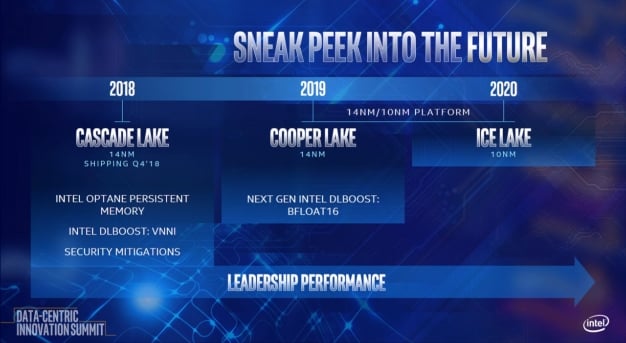Intel's First 10nm Ice Lake-SP Xeon Chips Arriving In 2020, 14nm Cooper Lake-SP Lands In 2019
That is all changing today, as the company announced plans at its Data-Centric Innovation Summit for the next two years with regards to its Xeon Scalable processor family. The first round of processors in the Xeon Scalable processor family will be based on Cascade Lake (targeted late 2018 launch), and will continue on with 14nm++ process technology.
The processors will support Optane DC persistent memory and will incorporate Intel DL Boost, which the company describes as an embedded AI accelerator. According to Intel, DL Boost will provide an 11x uplift in deep learning performance compared to current generation Xeon-SP processors.
Cooper Lake will be Intel's 2019 follow-up, and it will bring further optimizations to both DL Boost and Optane DC support. The only other details that Intel is providing at this time is that Cooper Lake will be a "new generation platform" and that it will offer "significant performance improvements". Like Cascade Lake-SP, Cooper Lake-SP will also be a 14nm++ design.
We won't see our first look at 10nm+ based Xeon Scalable processor until sometime in 2020 according to Intel, and these will fall under the Ice Lake-SP umbrella.
However, we must note that Intel isn't operating in a vacuum here. It is facing some significant pressure from AMD, which is gaining market share (albeit slowly) with its EPYC family in the server market. AMD's Zen-based microarchitecture has proven to be a multi-core performance beast and the company is looking to accelerate its encroachment into Intel server processor territory with its next-generation EPYC processors. Samples of 7nm Zen 2-based EPYC processors are on track to ship later this year, with a volume ramp taking place next year when Intel will be pushing its 14nm++ Cascade Lake-SP chips



